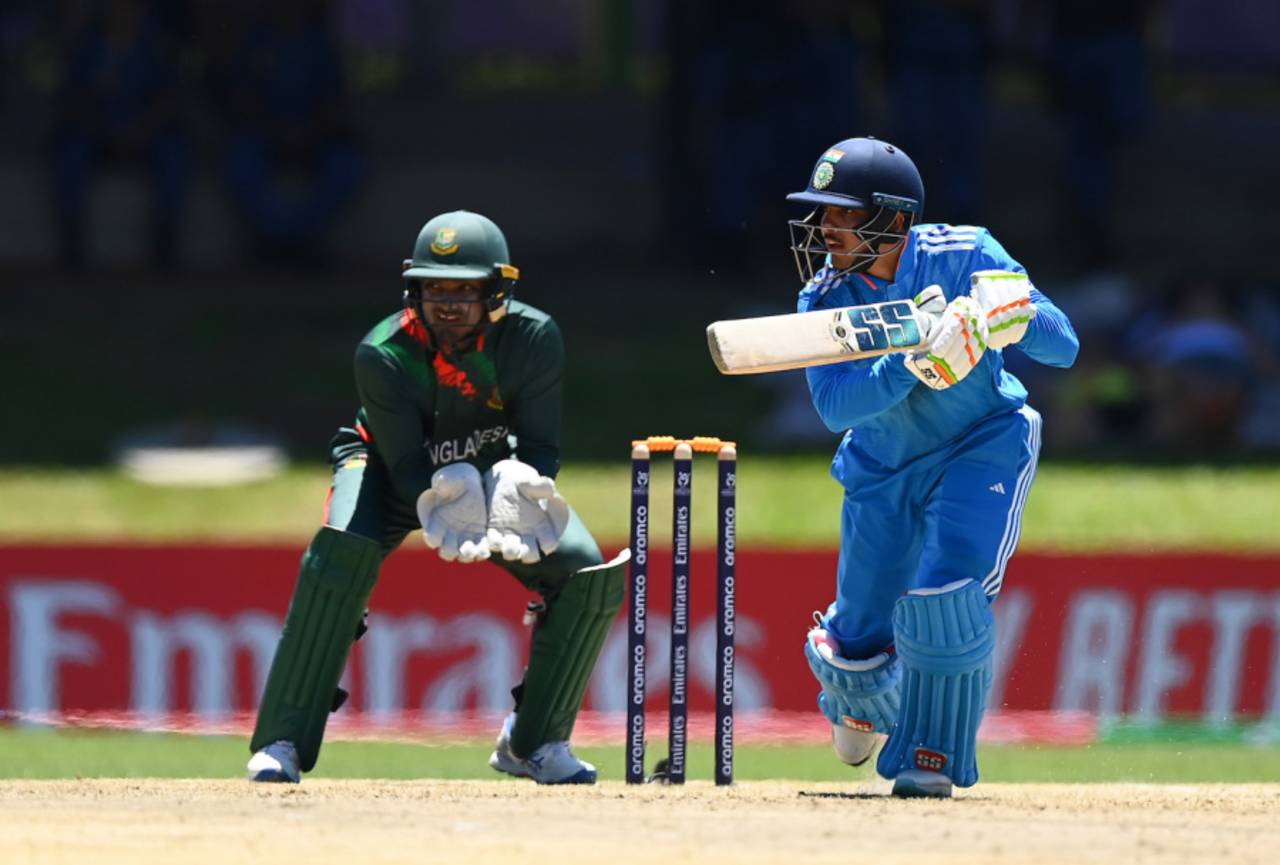Seven to watch in the Super Sixes
Three batters, two quicks and two spinners who could light up the business end of the Under-19 World Cup

Uday Saharan scored fifties in India's first two games • ICC via Getty Images
India's captain has made the most of his time in South Africa with a century in the pre-tournament triangular series, two half-centuries in two warm-up games and two more in India's first two matches. He has also been part of two of India's three match-winning century stands, has used himself briefly - and successfully - as a bowler, took a good running catch at point in the final group-stage match, and has led the side astutely. Saharan's use of his bowlers, particularly Saumy Pandey in the powerplay, has been impressive and we can expect his all-round ability to be on display as the tournament nears its business end.
Kwena Maphaka is making things happen, and things are happening for him
Oscar Jackson, the criminal justice student who captains New Zealand Under-19
India's next-gen arrive amid changed perceptions, new landscape
'Precious' Jewel Andrew fulfills promise to mother as he lives his dream
Under-19 WC Super Six: 12 teams, two groups, and why there is no India-Pakistan clash
The leading run-scorer from the group stage, Pakistan opener Shahzaib Khan has earned two player of the match performances for his century against Afghanistan and his unbeaten 86-ball 80 against New Zealand. The latter was particularly notable and came in a 10-wicket demolition job in which Pakistan chased 141 inside 26 overs. Shahzaib appears strong on the off side and square of the wicket and has shown the temperament to pace an ODI innings well. His challenge will come from Pakistan moving away from the coastal city of East London and to livelier surfaces in Potchefstroom and Benoni and it will be interesting to see how he adjusts his game.

At just 17 years old, the strongly-built Steve Stolk has all the makings of a modern white-ball batter, most notably strength. He is South Africa's second-highest run-scorer so far, with two half-centuries to his name and one significant record. Rishabh Pant's 18-ball fifty in 2016 was the fastest in this format until Stolk smashed a half-century off 13 balls against Scotland, including 34 off one over to get South Africa off a rollicking start as they went after a table-topping win. They chased 270 in just 27 overs and leapfrogged both West Indies and England in Group B. So far, Stolk has the highest overall tournament strike rate of 158.16, (among batters who have scored more than 50 runs) and has also struck the most sixes with nine.
Not only is Australia's leading wicket-taker Callum Vidler quick but he has also found movement on a usually placid Kimberley pitch. Against Namibia, he kept his lengths full, generated late swing, shattered the stumps twice and found the edge to take four. Against Sri Lanka, he extracted good bounce for his three wickets. Having adjusted to conditions at the venue, he will be best placed to exploit them when Australia play their two Super Six matches there and the pace will keep coming. As he said in an interview with the ICC: "My job is to bowl fast and if anyone ever tells me to slow down, I don't listen to that."
Left-arm spinner Vishwa Lahiru has been a consistent threat in the group stage with at least two wickets in each of his matches. He has bowled with good pace and found turn and, with Sri Lanka using him as a wicket-taking option in the powerplay, has taken out top-order players in all three group stage matches. Of spinners who have taken at least seven wickets in the tournament so far, Lahiru's economy rate of 2.50 is only bettered by Pandey.

Another seamer enjoying South African surfaces is New Zealand's Matt Rowe, who took 5 for 21 against Afghanistan to register one of his country's three best hauls in the tournament's history behind Trent Boult and Tim Southee. He also hit the winning runs in what turned into a nailbiter to show some nerve at the end. Overall, his six wickets have come at an average of 15.50 and an economy rate of 4.22. Among seamers who have taken six or more wickets at the tournament so far, only Australia's Vidler and Mahli Beardman have been more miserly. New Zealand move to Bloemfontein for their Super Six matches where there has been some assistance on offer for the quicks early on and Rowe's performances there could prove well worth watching.
The most successful legspinner in the Super Sixes, England's Tazeem Chaudry Ali has been effective in dismantling middle orders and did so against both South Africa and West Indies. His googly has proved difficult to pick and he has used it well so far. Despite missing his team's opening match against Scotland, his six wickets make him their leading wicket-taker in the group stage and an economy rate of 3.00 is nothing to scoff at.
Firdose Moonda is ESPNcricinfo's correspondent for South Africa and women's cricket